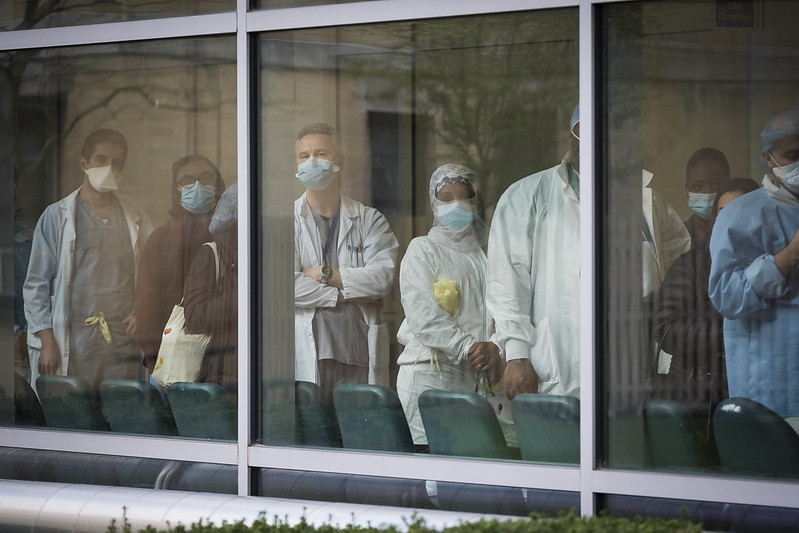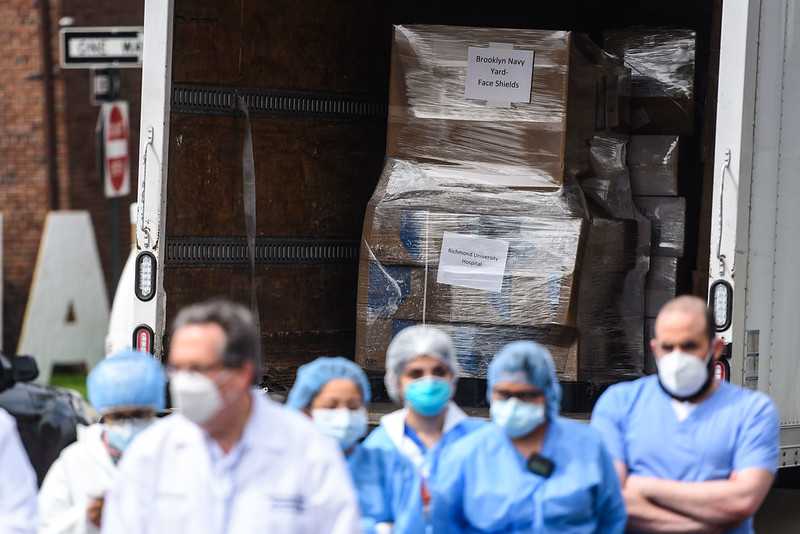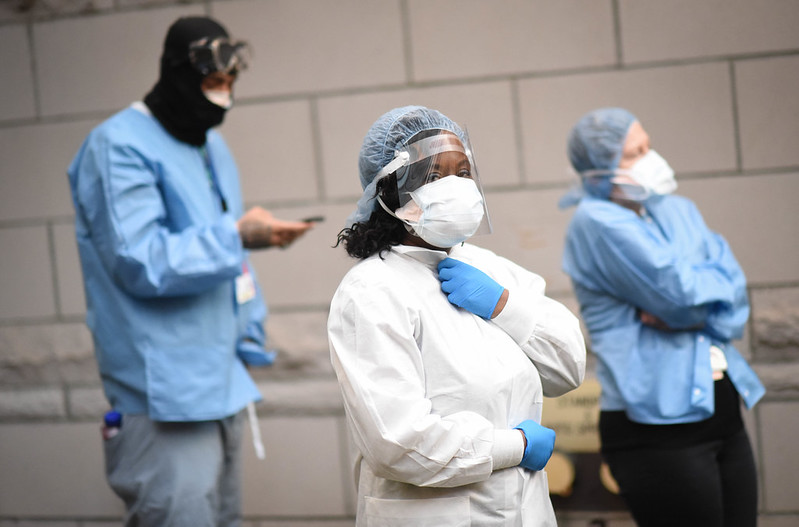What Covid and the 2020 Elections Taught Us: It’s Time to Do Right by New Yorkers on Health Care

Health care remains the top issue for voters (photo: Ed Reed/Mayor's Office)
The Biden-Harris victory is great news and a huge relief. Our country has suffered under Trump.
But we have a problem. A record number of voters rejected a national campaign that stood for greater economic fairness, science-based policies on COVID-19 and the environment, protecting health care coverage, and racial justice.
In New York state legislative races, moderate and progressive candidates did well, achieving strong legislative majorities for Democrats in both houses. But several challengers as well as good incumbents running for re-election lost or won in races that were real nail-biters. After all we went through with Trump, these candidates, and others, should have had stronger results.
As we look forward, we need to ask: What’s wrong, and how do we fix it.
Many working people across the country, in every demographic group, are disillusioned. They believe many of our political leaders are too close with corporate interests and fail to fight on vital kitchen-table economic issues.
Many people have been swayed by campaigns that make dishonest accusations and exploit divisive issues and fears.
But that doesn’t mean they can’t be won back or for the first time, to support policies that would make a real difference in their daily lives and futures.
To achieve that, I believe we must strengthen our progressive message, not move away from it.
Opinion polls have long told us that health care is the number one issue for the most voters. And while the Affordable Care Act has done a lot of good, COVID-19 has further exposed the gaping shortfalls and gross inequality that plague American health care.
Three quarters of our neighbors are afraid that they cannot afford their health care or health coverage and fear medical debt. Each year, a third of families who have health coverage have a household member who goes without needed health care because of cost; their health coverage doesn’t do the job.
We don’t have real choices. The vast majority of employees are covered by a health plan that’s tied to their job. Health plans impose rising premiums, deductibles, and copays, and we have to pay them if we want to keep our insurance. Health plans dictate which doctors, hospitals, and medicines they cover. And they impose the same costs whether you’re a multi-millionaire CEO or a receptionist.
If you lose your job, which has happened to millions of people, you lose job-connected health coverage.
Access to health care is diminishing. Losing hospitals, doctors, nurses, and neighborhood pharmacies is a growing problem in many communities, including rural areas, in large part because “third party payers” (i.e., health insurance companies) underpay them or exclude them from their restrictive provider networks.
We need to deliver a health plan that by law guarantees everyone complete coverage; complete choice of doctors, hospitals, and other health-care providers; and is funded based on ability to pay. It should include long-term care (home care and nursing home care), which can be a frightening cost that can wipe out a family’s lifetime savings.
In New York, this means the New York Health Act to establish universal single-payer health coverage. It’s more comprehensive than any health plan available. Having us all in the same boat – rich and poor alike – is the best way to guarantee it’s the best possible plan.
Passing the New York Health Act is the one best thing we can do for the health and family finances of almost every New Yorker.
Does the covid recession mean we can’t afford it? No.
Taking insurance companies out of the picture will save New York $55 billion a year we now waste on insurance company bureaucracy, marketing, and profit; on administrative costs doctors and hospitals spend fighting with insurance companies; and on the excessive prices we pay to drug companies because no single insurer has enough bargaining clout to force prices down.
These savings would enable us to cover the uninsured and cover what New Yorkers now spend on deductibles, co-pays, out-of-network charges, and other out-of-pocket costs. Instead of premiums, the New York health plan will be funded through a broad-based tax based on ability to pay.
It will simplify an excessively complicated and convoluted system, for patients, health-care providers, and employers, while providing universal health coverage for all New Yorkers, regardless of ability to pay and not attached to employment.
The New York Health Act has passed the State Assembly four times. We need to do it again and get it through the State Senate. New York’s health depends on it.
***
Assemblymember Richard N. Gottfried represents parts of Manhattan and is the chair of the New York State Assembly Health Committee. On Twitter @DickGottfried.
***
Have an op-ed idea or submission for Gotham Gazette? Email This email address is being protected from spambots. You need JavaScript enabled to view it.
Creating a New Hub to Protect and Empower Brooklynites

Supplies arrive in Brooklyn (photo: Michael Appleton/Mayor's Office)
Every neighborhood in New York City has been touched in some way by the COVID-19 pandemic. But due to longstanding disparities in our health-care system and structural economic inequality, communities of color have been more susceptible to the virus and more vulnerable to its consequences.
One of these consequences was the distant and dysfunctional health-care supply system, which left safety net hospitals like One Brooklyn Health, which serve and employ the city’s most vulnerable, without the personal protective equipment and medical supplies necessary to keep both patients and staff safe. While President-elect Biden has made clear his team will take an aggressive stance to fighting the virus, the surge in cases in our city is proof that we must act now to prevent another massive calamity. That is why Brooklynites are coming together now to address the structural impediments to local, quality health care.
Building on years of partnership, a rich array of organizations have come together as Brooklyn Communities Collaborative (BCC), united under the common goal of improving health and wealth, and precisely addressing the conditions that have left too many Brooklynites at the mercy of the virus. BCC’s founding anchor institutions include the One Brooklyn Health System, Maimonides Medical Center, the City University of New York (CUNY), and a new social enterprise entitled Citizen Share Brooklyn.
A key aspect of BCC’s work is the anchor mission approach, which calls on institutions rooted in their local community, such as universities and hospitals, to fully harness their economic power through hiring, purchasing, and investing to inclusively and sustainably benefit the long-term health and wealth of their communities.
To leverage the economic power of these anchor health-care institutions, which spend billions of dollars annually on goods and services, BCC and strategic partner Citizen Share Brooklyn will be launching the Brooklyn Health Enterprise Hub — a borough-wide regional health-focused workforce development and enterprise ecosystem.
Comprised of key stakeholders in the health-care industry, including 1199SEIU, the New York State Nurses Association, and other labor unions, employers, academic institutions, as well as community-based organizations, the Hub will redirect the supply chain to benefit the local economy, particularly in neighborhoods most affected by structural racism and economic inequality.
Specifically, the Hub will help implement leading workforce engagement, recruitment, and development practices to identify, recruit, and retain top talent in Brooklyn, expand high-quality health services training programs to meet the needs of anchor health institutions, and establish an approach to securing working capital for business launches and business expansions. Taken together, these initiatives will significantly increase local spending by anchor health institutions, thereby creating more local jobs and local profits.
The Hub will also address the challenges exposed during the current crisis, with plans to create a local supply for essential items.
Ultimately, with leaders across various sectors, boroughs and regions, the Hub will advance a progressive reform of the dysfunctional supply chain – one that adheres to the principles of democratic accountability, equity, and community self-governance by investing in local enterprises that promote economic democracy. A reformed health care supply chain must support local workers not just by paying a living wage, but by investing in forms of citizen-based profit-sharing as well as enterprises that will directly address the depression of wealth – which has exacerbated structural economic inequality and contributed to poor health in communities of color.
To truly succeed, any progressive COVID-19 recovery effort must not only bring us back to where we were before this crisis, but also build a reformed infrastructure for health and shared wealth. The Health Enterprise Hub will serve as a national model in response to the racial, economic, and health-care challenges that are currently facing our nation. The next stage of the recovery effort will require us to be courageous and innovative like never before. Only then can we ensure all communities have the same opportunity to live longer and healthier lives.
***
George Gresham is President of 1199 Health Care Workers East. Representative Hakeem Jeffries represents parts of Brooklyn and Queens. LaRay Brown is CEO of One Brooklyn Health.
***
Have an op-ed idea or submission for Gotham Gazette? Email This email address is being protected from spambots. You need JavaScript enabled to view it.
We Must Not Return to ‘Normal’: Seizing Our Opportunity to Rethink Health and Health Care in New York

Health care workers during covid (photo: Michael Appleton/Mayor's Office)
Last month, Governor Andrew Cuomo delivered remarks at Riverside Church on the inequities in the Trump administration's COVID-19 vaccine distribution plan. He admirably stated that we must prioritize fairness and equity. Communities like many in the Bronx that have suffered the most because of this virus must not be left behind. But that commitment to leaving no community behind must also be applied to addressing the underlying issues that led to disproportionately negative outcomes for impoverished communities of color impacted by the virus.
Governor Cuomo was right when he stated, ”Covid low tide in America also showed us the deep inequality in our country and the systemic discrimination in this nation. The truth is covid killed Black people in this country at twice the rate of white people. The truth is covid killed Hispanic people at 1.5 times the rate of white people. Those are ugly facts. The covid infection rate was 2.5 times higher among Black and Hispanic people and the hospitalization rate for Black and Hispanic patients was over three times higher compared to white patients.”
This accurately describes our experience at SBH Health System (SBH). For the community we represent, a return to "normal" would be both a disaster and an affront, as it would not address the life and death issues being further exposed by this "low tide" moment in America. According to the New York City Department of Health's COVID-19 database, more than 90% of Bronx residents who have died from COVID-19 had preventable underlying health conditions.
A recent study by Gibenga Ogedegbe, et al also supported the fact that Black and Hispanic populations were more likely to test positive for COVID-19, and although their in-hospital mortality rate was not higher than white patients, “the structural determinants pervasive in Black and Hispanic communities, including inequality in housing, access to care, differential employment opportunities and poverty…explain the disproportionately higher out of hospital deaths due to COVID-19 infections in these populations.”
Moving forward, we know that access to affordable and accessible quality community health care will be a primary factor in addressing the systemic health-care inequities in New York. Without coordinated patient-centered care, it will not be possible to ensure appropriate care continuity. Coordination is key to prevent redundancies and lost opportunities across the entire health-care delivery system, from vaccinations to highly-specialized procedures.
This means primary care clinicians and specialists, ambulatory surgery centers, specialized procedural centers, hospitals, and post-acute care facilities must seamlessly interact on behalf of the patient. We began to see the immediate benefit of this coordination during the height of the pandemic last spring, when hospital systems and others developed collaborative relationships with each other, in concert with public health officials to effect rapid responses to the crisis.
We also know that health and wellness depends not only on healthcare delivery, but also on those social determinants of health that interfere with that delivery. New York must immediately adopt policies that embrace and demand value-based health care. This must include a continued and renewed financial commitment to move health-care delivery from a volume- and profit-driven model to a value-based model that encourages providers and payers to collaborate and focus on programs aimed at improving the health, wellness, and resilience of all communities.
As part of this program, we must preserve the safety net by investing in community-based anchor institutions such as SBH, which has consistently exhibited a commitment to broad-based Bronx community partnerships aimed at improving the lives of the residents of the Bronx.
Our Affordable Housing and Wellness Center Development, in part supported by New York State, is an example of this willingness, and we are proud that we have created opportunities for hundreds of families by investing in safe, clean, affordable, and permanent housing, including for those who were formerly homeless. But it’s not enough.
The Bronx continues to rank 62nd of 62 New York counties in terms of health and wellness, according to the RWD Community Health Rankings. Housing, physical, and food insecurities; education, income, technological, and health-care disparities -- many of them further revealed by the impacts of covid -- must be addressed to ensure that the next pandemic doesn't wipe out the rest of our community.
The moment is now to right the wrongs of previous generations and put our communities on a different trajectory. We have a real opportunity and responsibility to address once and for all the structural inequities that have contributed to the overwhelming losses experienced in our community. New York can serve as a model for the rest of the country about who we are and who we must be, and in the process create a “new normal” that guarantees opportunity and fairness for all New Yorkers.
***
David Perlstein, MD MBA FAAP, is President and CEO of SBH Health System. On Twitter @SBHBronx.
***
Have an op-ed idea or submission for Gotham Gazette? Email This email address is being protected from spambots. You need JavaScript enabled to view it.




